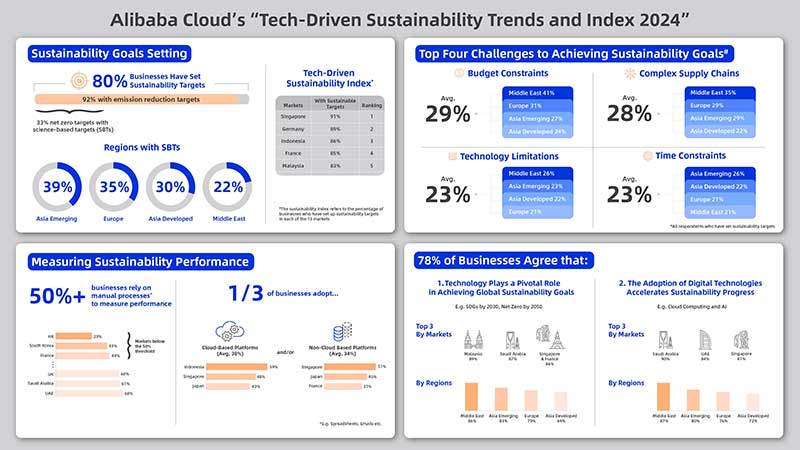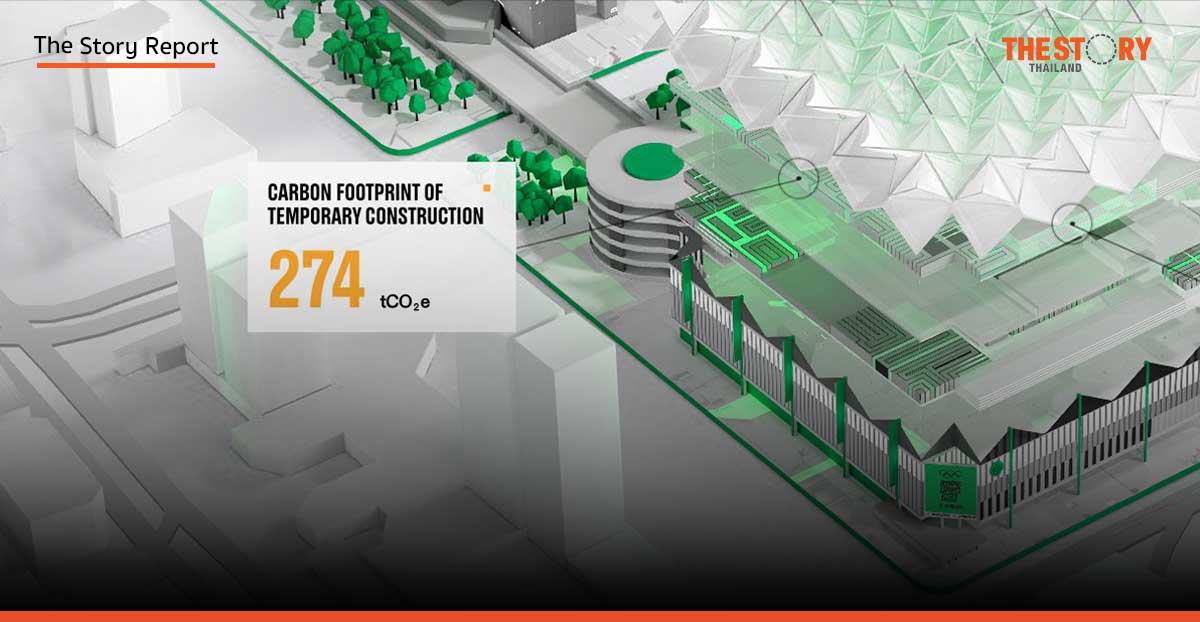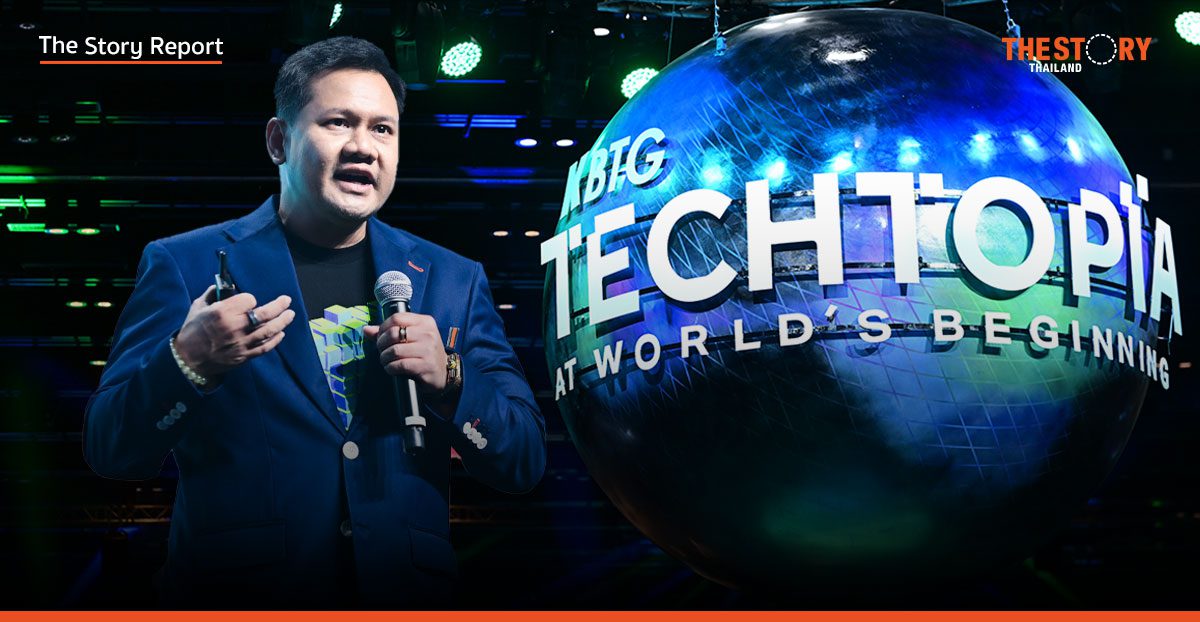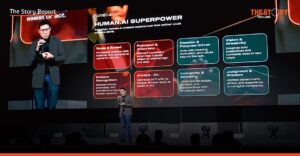Like their peers elsewhere in the world, most Thai businesses still rely mainly on manual methods to measure their progress on sustainability, a survey has found.
It was found that 80% of businesses surveyed across Asia, Europe and the Middle East have set targets for their sustainability efforts, but only a third of them use digital software tools like cloud platforms to measure their progress.
As much as 53% of those surveyed said they continue to rely on manual methods such as spreadsheets and emails for measuring their sustainability performance, according to the survey report titled “Tech-Driven Sustainability Trends and Index 2024”.

Thai businesses share a similar trend, with 82% of them setting up sustainability targets, but half of those surveyed say they still use manual methods to measure their efforts. Of the Thai businesses that have set sustainability targets, 66% say they are on track to achieve them.
The survey, commissioned by Alibaba Cloud, was conducted between May 10 and June 19 by the UK-based Yonder Consulting. The 1,300 respondents were business leaders and senior executives from various industries, including technology and communications, finance, infrastructure, renewable resources, healthcare, transportation, retail, and manufacturing. The poll covered 13 markets in Asia (Indonesia, Malaysia, the Philippines, Thailand, Hong Kong, Japan, Singapore, and South Korea), Europe (France, Germany, and United Kingdom), and the Middle East (Saudi Arabia and UAE).
Established in 2009, Alibaba Cloud is the digital technology and intelligence backbone of Alibaba Group, a Chinese multinational tech giant headquartered in Hangzhou, China. It offers a wide range of cloud services to customers worldwide, including elastic computing, database, storage, network virtualization services, large-scale computing, security, big data analytics, machine learning and AI solutions.
Thailand is making strides
Alibaba Cloud said survey results show that Thailand’s corporate world is on par with many of its regional counterparts in recognizing the importance of sustainability. It was found that 80% of Thai businesses emphasize the importance of developing technology sustainably – only slightly below the regional average of 82% for Asia. Also, 46% of Thai organizations prioritize a commitment to sustainability when choosing technology service providers.
“Thailand is making strides in enhancing its infrastructure to support sustainability goals. The emphasis placed by Thai businesses on sustainability indicates a growing awareness and investment in areas such as renewable energy and efficient waste management,” Alibaba Cloud said in its reply to The Story Thailand questions. “Additionally, the call for a commitment to sustainability in technology services suggests that organizations are likely looking to integrate more sustainable practices into their operations, which could extend to infrastructure improvements.”
The survey also found that as businesses strive to enhance their sustainability efforts, they need effective digital tools and better understanding of those tools. Most respondents (59%) acknowledged a gap in their knowledge regarding how technology can help achieve sustainability goals. This sentiment is particularly evident in Singapore (83%), Hong Kong (75%), and Thailand (70%).
As per the survey report, 92% of the businesses with sustainability targets have set emission reduction targets, but only one-third of them have committed to net-zero commitments.
Tech is key to sustainability
It was also found that 78% of businesses agree technology is crucial for achieving global sustainability goals. The same number of respondents believe that adopting digital technologies such as cloud computing and artificial intelligence (AI) will accelerate progress toward meeting sustainability goals.
Around half of the businesses with sustainability targets cite driving growth (56%), compliance with regulations (54%), and a strong corporate purpose (49%) as their key motivations for establishing targets. For Thai businesses, client requirements (45%), driving business growth (44%) and regulatory compliance (43%) are top three reasons for sustainability targets setting.
Businesses encounter various barriers in meeting their sustainability targets, the survey found. Budget constraints emerge as the most significant obstacle, affecting 29% of organizations, while complex supply chains further complicate efforts, impacting 28% of businesses, with Thailand unveiling a higher percentage of 32%.
Technology limitations hinder 23% of companies, and time constraints also present significant challenges across all regions, affecting 23% of organizations, with Thailand experiencing the highest rate of 34%.
For those yet to set sustainability targets, budget constraints (32%) and technology limitations (29%) remain the primary barriers to meeting sustainability targets.
Setting more realistic targets

Wei Liu, Head of ESG Strategy at Alibaba Group, commented on how technology can help organizations to set more realistic sustainability targets and to be effective in measuring that progress, challenges from clients in meeting their sustainability goals, and government’s role in driving sustainability.
“You need green transformation and digital transformation going side by side together,” he said during a recent online panel discussion titled “Navigating the Path to Corporate Sustainability with Technology in Asia”.
“By leveraging AI and intelligence insights, we believe that ourselves and other businesses can identify carbon emissions across their operations and thus, be able to implement optimization solutions that is actionable. This was what people often say that you cannot manage it without measurement and quantification,” Liu added.
Assoc Prof Dr Matthew Dearth fromNanyang Technological University in Singapore, spoke about how educational institutions support businesses in setting more ambitious targets and action plans as well as financing’s role in supporting the sustainable practices.
“From an educational perspective, I think there was also a tremendous amount of work being done basically to educate either the current or next generation of business leaders with respect to what we mean and what’s required when it comes to having companies and society act more sustainably,” he said during the panel discussion hosted by Alibaba Cloud.
“For this whole change that we need to undertake as a society, it takes a little bit from every one of us. Company leaders have to understand this is truly a journey that will take a long time. You need systems, tools and technology to get there more efficiently over time,” the professor added.
Roy Cheung, Global Head of Sustainability Solutions and Engineering Plastics at Covestro, said companies can learn from each other about successful sustainability initiatives, regardless of which industries they are.
“In Southeast Asia, the challenges could be lack of access to technology, financing and data. But we also see opportunities,” he said during the panel discussion.
Cheung said that three years ago, his company prepared customer FAQ documents manually, but now it has developed an AI chatbot to handle inquiries. “With increased availability of technology, easier adoption of the technology, and lower cost for implementation, we see more opportunities ahead,” he added.
Hoxton Farms makes cruelty-free fat for meat alternatives
Top 10 strategic technology trends for 2025












